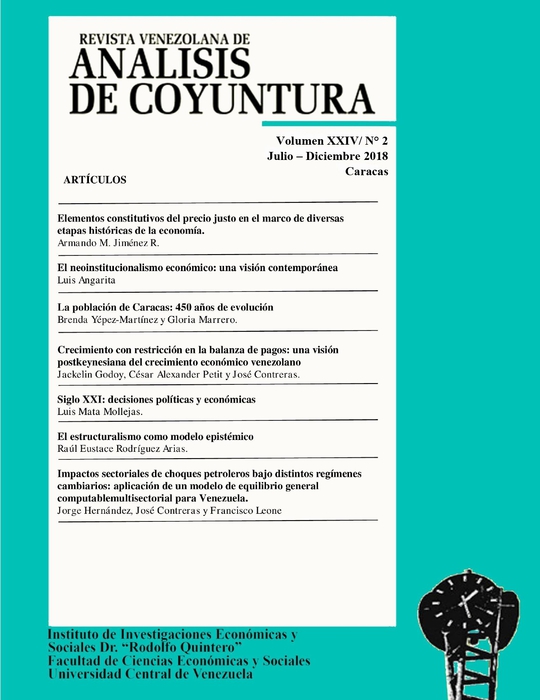SIGLO XXI: DECISIONES POLÍTICAS Y ECONOMÍA
DOI:
https://doi.org/10.54642/rvac.v24i2.16866Palabras clave:
Decisiones, Visión fragmentaria vs sistémica, Comportamiento político y procesos económicosResumen
El examen de la interacción entre comportamientos políticos y procesos económicos, dentro de un marco de relaciones lógico-causales: La Economía Política, se inicia en la Grecia clásica (siglo VI a. C.) con aceptación general hasta finales del siglo XIX (d. C.). Entre el final de dicho siglo y a lo largo del siglo XX, a la reflexión lógica causal (deductiva) se incorpora el contraste empírico (lógica inductiva) dando lugar al estudio de las relaciones sociales y de sus vinculaciones con los procesos que gobiernan la disponibilidad de medios materiales, pasa satisfacer las necesidades humanas, subrayando los aspectos del intercambio mediante los conceptos monetarios o estudios científico de los procesos económicos: The Economics; que incluye aportes de visiones parciales, o especializadas, al discutir la interacción entre los distintos actores sociales: consumidores, productores y gobierno, con relación al consumo directo de bienes y al uso de otros (bienes durables) que cooperan con la producción: el capital, dando origen a las llamadas políticas macroeconómicas. Pero la verosimilitud de esa visión fragmentaria se vio comprometida a partir de la segunda mitad del siglo XX, al observarse que el propósito de aumentar el bienestar material, al compás del aprovechamiento de los avances en las ciencias naturales, para el uso eficaz y eficiente de la naturaleza (periphiseos) se interrumpía con frecuencia; causando insatisfacciones en las poblaciones y fuertes tensiones políticas en los diversos Estados y entre ellos. Del estudio de estos asuntos en el transcurso de la novena década del siglo XX y del inicio del siglo XXI, se infiere que las situaciones de malestar económico-político se explican por la presencia autoritaria de los agentes financieros; por lo cual este ensayo propone, como corrección epistemológica encaminada a solucionar dichas crisis, el rescate de la visión integral o sistémica que caracterizaba a la Economía Política, aprovechando los logros de la visión fragmentaria al incorporar el análisis de la influencia de las circunstancias financieras y especulativas en la interacción política-económica al interior de las naciones y el de la fuerza gravitatoria de la tenaza dólar-petróleo entre los diversos Estados.
The examination of the interaction between political behaviour and economic processes, within a framework of logical-causal relationships: Political Economy, starts in classical Greece (6th century BC) with general acceptance until the end of the 19th century (AD). Between the end of this century and throughout the twentieth century, the causal (deductive) logical reflection incorporates the empirical contrast (inductive logic) giving rise to the study of social relations and their links with the processes that govern the availability of material means, goes to satisfy human needs, underlining the aspects of exchange through monetary concepts or scientific studies of economic processes: The Economics; that includes contributions of partial, or specialized visions, when discussing the interaction between the different social actors: consumers, producers and government, in relation to the direct consumption of goods and the use of others (durable goods) that cooperate with production: capital, giving origin to the so called macroeconomic policies. But the verisimilitude of that fragmentary vision was compromised from the second half of the twentieth century, when it was observed that the purpose of increasing material welfare, to the rhythm of the use of advances in the natural sciences, for the effective and efficient use of nature (periphiseos) was frequently interrupted; causing dissatisfactions in the populations and strong political tensions in the diverse States and among them. From the study of these matters in the course of the ninth decade of the twentieth century and the beginning of the twenty-first century, it is inferred that the situations of economic-political malaise are explained by the authoritarian presence of financial agents; Therefore, this essay proposes, as an epistemological correction aimed at solving such crises, the rescue of the integral or systemic vision that characterized the Political Economy, taking advantage of the achievements of the fragmentary vision when incorporating the analysis of the influence of the financial and speculative circumstances in the political-economic interaction within nations and that of the gravitational force of the dollar-oil pincer between the diverse States.
Descargas
Descargas
Cómo citar
Número
Sección
Licencia
Los autores que publican en la Revista Venezolana de Análisis de Coyuntura, RVAC, Revista Digital del Instituto de Investigaciones Económicas y Sociales “Dr. Rodolfo Quintero”, de la Universidad Central de Venezuela, están de acuerdo con los siguientes términos:
- Los autores conservan los derechos de autor y garantizan a la revista el derecho de ser la primera publicación del trabajo al igual que licenciado bajo una Creative Commons Attribution License que permite a otros compartir el trabajo con un reconocimiento de la autoría del trabajo y la publicación inicial en esta revista.
- Los autores pueden establecer por separado acuerdos adicionales para la distribución no exclusiva de la versión de la obra publicada en la revista (por ejemplo, situarlo en un repositorio institucional o publicarlo en un libro), con un reconocimiento de su publicación inicial en esta revista y no se use para fines comerciales.
- Los contenidos e imágenes que se incluyen en los artículos son responsabilidad del autor (es). La RVAC, del del Instituto de Investigaciones Económicas y Sociales “Dr. Rodolfo Quintero”, de la Universidad Central de Venezuela, no se hace responsable de la información incluida en ellos.
- Los autores están de acuerdo con la licencia de uso utilizada por la revista, con las condiciones de auto-archivo y con la política de acceso abierto.
- Se permite a los autores difundir electrónicamente (por ejemplo, en repositorios institucionales o en su propio sitio web) la versión publicada de sus obras, ya que favorece su circulación y difusión más temprana y con ello un posible aumento en su citación y alcance entre la comunidad académica.
- En caso de reutilización de las obras publicadas debe mencionarse la existencia y especificaciones de la licencia de uso además de mencionar la autoría y fuente original de su publicación.









